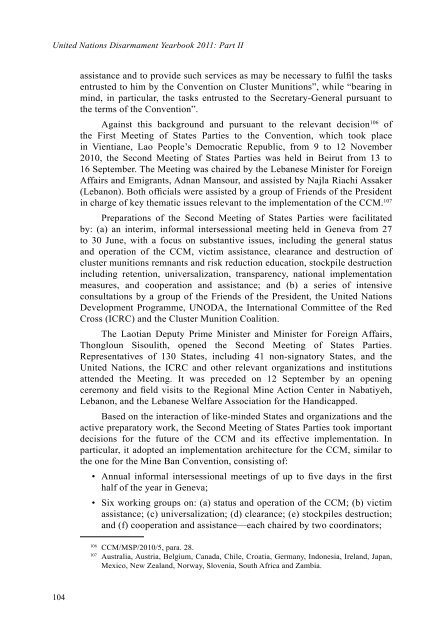DYB2011-Part-II-web
DYB2011-Part-II-web
DYB2011-Part-II-web
Create successful ePaper yourself
Turn your PDF publications into a flip-book with our unique Google optimized e-Paper software.
United Nations Disarmament Yearbook 2011: <strong>Part</strong> <strong>II</strong><br />
104<br />
assistance and to provide such services as may be necessary to fulfil the tasks<br />
entrusted to him by the Convention on Cluster Munitions”, while “bearing in<br />
mind, in particular, the tasks entrusted to the Secretary-General pursuant to<br />
the terms of the Convention”.<br />
Against this background and pursuant to the relevant decision106 of<br />
the First Meeting of States <strong>Part</strong>ies to the Convention, which took place<br />
in Vientiane, Lao People’s Democratic Republic, from 9 to 12 November<br />
2010, the Second Meeting of States <strong>Part</strong>ies was held in Beirut from 13 to<br />
16 September. The Meeting was chaired by the Lebanese Minister for Foreign<br />
Affairs and Emigrants, Adnan Mansour, and assisted by Najla Riachi Assaker<br />
(Lebanon). Both officials were assisted by a group of Friends of the President<br />
in charge of key thematic issues relevant to the implementation of the CCM. 107<br />
Preparations of the Second Meeting of States <strong>Part</strong>ies were facilitated<br />
by: (a) an interim, informal intersessional meeting held in Geneva from 27<br />
to 30 June, with a focus on substantive issues, including the general status<br />
and operation of the CCM, victim assistance, clearance and destruction of<br />
cluster munitions remnants and risk reduction education, stockpile destruction<br />
including retention, universalization, transparency, national implementation<br />
measures, and cooperation and assistance; and (b) a series of intensive<br />
consultations by a group of the Friends of the President, the United Nations<br />
Development Programme, UNODA, the International Committee of the Red<br />
Cross (ICRC) and the Cluster Munition Coalition.<br />
The Laotian Deputy Prime Minister and Minister for Foreign Affairs,<br />
Thongloun Sisoulith, opened the Second Meeting of States <strong>Part</strong>ies.<br />
Representatives of 130 States, including 41 non-signatory States, and the<br />
United Nations, the ICRC and other relevant organizations and institutions<br />
attended the Meeting. It was preceded on 12 September by an opening<br />
ceremony and field visits to the Regional Mine Action Center in Nabatiyeh,<br />
Lebanon, and the Lebanese Welfare Association for the Handicapped.<br />
Based on the interaction of like-minded States and organizations and the<br />
active preparatory work, the Second Meeting of States <strong>Part</strong>ies took important<br />
decisions for the future of the CCM and its effective implementation. In<br />
particular, it adopted an implementation architecture for the CCM, similar to<br />
the one for the Mine Ban Convention, consisting of:<br />
• Annual informal intersessional meetings of up to five days in the first<br />
half of the year in Geneva;<br />
• Six working groups on: (a) status and operation of the CCM; (b) victim<br />
assistance; (c) universalization; (d) clearance; (e) stockpiles destruction;<br />
and (f) cooperation and assistance—each chaired by two coordinators;<br />
106 CCM/MSP/2010/5, para. 28.<br />
107 Australia, Austria, Belgium, Canada, Chile, Croatia, Germany, Indonesia, Ireland, Japan,<br />
Mexico, New Zealand, Norway, Slovenia, South Africa and Zambia.


